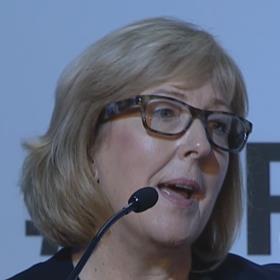Fiona Reynolds (@Fireynolds), CEO, PRI

Looking back just a few short months to celebrating the New Year at home in Australia, I thought the worst the year could bring were the fires raging across the country. However, returning to the UK brought no respite. The nightly news was full of domestic flood scenes and the destruction that followed. How wrong I was to think that this was it—the worst was over! Never in my wildest dreams would I have imagined that less than two months later I would begin scenario planning for Coronavirus followed quickly by developing a COVID-19 Action Plan for the PRI.
COVID-19 has certainly taken the world by surprise and few of us—whether individuals, businesses, investors or governments—were truly prepared for its devastating impacts. Once again we are being taught the stark lesson of how key risks can turn into disastrous realities.
When the dust begins to settle, one of the first post-crisis questions we need to ask ourselves is: why were we all taken by such surprise? It’s not as though the warning signs weren’t there.
The World Economic Forum’s 2020 Global Risks Report ranks infectious diseases among the top ten risks we face over the next decade in terms of impact; though in fairness to us all, it didn’t make the top 10 in terms of likelihood. So, did we simply fail to heed the voices telling us that we needed to prepare for a pandemic in the same way we prepare for war, terrorist attacks or a nuclear threat?
Hindsight is a wonderful thing, but of course only helps if it serves to change our behaviour in mitigating risks for the future.
Embracing the opportunity for change
In the face of the ever-increasing economic devastation stemming from COVID-19, people are again beginning to question whether the global financial system is fit for purpose in the 21st century. While there are certainly parallels with the global financial crisis just over a decade ago, there are also signs of change and evidence that some valuable lessons have been learned. This time around, in response to the virus, we’re seeing values of community and mutual support shine through and a far more human-centric economic response from governments, business and the investment community alike.
This evolution in response has been aided by the emergence of a more progressive mindset over the past decade. This mindset reflects a shift in values that has been embodied in the environmental, social and governance (ESG) philosophy. It is working to align investments with long-term value creation and driving a more holistic approach to the role both corporations and finance play in society.
Increased societal expectations and growing accountability around these roles is one of the outcomes of the financial crisis. How corporations and finance respond to this new crisis will be more sharply judged against this ESG criteria. The landscape has changed around us. Accountabilities will be redefined and some corporations and investors will be unmasked as the lack of substance behind their ESG rhetoric becomes clear.
Nowhere has this shift been more evident than in the announcement last year from the Business Roundtable in the United States. It released a formal statement seeking to redefine the purpose of corporations, moving away from shareholder primacy to include a commitment to all stakeholders, including customers, employees, suppliers and communities in addition to shareholders. Now is the time that this new purpose will to be put to the test. Will their statements prove to be worth more than the paper they’re written on? Only time will tell.
How responsible investors should respond
As for the responsible investment community, it’s time for us to step up and play our role as long-term holders of capital, to call corporations to account. It’s time for asset owners sitting at the apex of the investment chain to lead the financial sector through this crisis. We need to maintain a focus on long-term horizons and support collective action while trying to understand the real issues companies are facing from COVID-19 as well as the flow on effects to our individual portfolios.
Most importantly, asset owners need to look to the interests of their beneficiaries and understand the impacts of the crisis at both an individual and systemic level. Short-term decisions up and down the investment chain all contribute to volatility and value destruction. Meanwhile collective action by the financial sector, sharing of the burden and investors supporting sound government policies all reduce the overall impacts—another lesson from the last crisis.
As we attempt to deal with this new crisis, COVID-19 raises several challenges for investors, including how to deal with their normal stewardship practices. At PRI we recommend that most engagement with companies in the short-term is re-prioritised and discussions on topics not relevant to COVID-19 and companies’ response to it are postponed. Of course, even in COVID-19 related engagements, unless there is evidence of irresponsible behaviour, we must allow companies adequate time and capacity to crisis manage and put plans into place.
Investors can also begin publicly signalling their support for a whole-of-economy response. This will provide much needed backing to governments for critical interventions and unprecedented stimulus packages that will help to deliver a successful and just recovery. We should also be vocal in saying that there must be a green and sustainable backbone to the stimulus.
Aligning the recovery with social and environmental outcomes
The pandemic has temporarily shifted public focus away from the climate and biodiversity emergency, but they are intrinsically linked. Destruction of habitats and ecosystems only risks further pandemics as diseases spread between animals and humans. As COVID-19 is stabilised, efforts to address these systemic issues are more critical than ever.
The crisis has already shown us what is possible when government, business, investors and civil society all come together. It has also shown us that we need to listen to the science and post-crisis we need to apply these principles and the same sense of urgency to the climate emergency.
But it’s not just environmental issues that need to be prioritised following the crisis. The responsible investment community needs to step up its actions on social issues as well, particularly those around human and labour rights. For far too long we have ignored the modern forms of exploitation surrounding the gig economy. Now we’re seeing the desperate consequences for millions of workers in precarious positions, shadow economy roles and day-to-day existence workers as COVID-19 takes hold across the globe, exacerbating inequalities.
The road ahead: working with PRI signatories
To assist investors in working through both the short- and long-term implications of the crisis, PRI will be convening COVID-19 focused working groups. We will work with our global signatory base to deepen our position in response to the crisis and to seek practical inroads towards implementation. We will be in contact next week with the full details of these groups, including how you can get involved.
Today we’ve published our briefing: How responsible investors should respond to the COVID-19 crisis, the first step in determining our response to the pandemic, including seven key actions for investors. I encourage all our global signatories to read and act on this guidance.
If there is any silver lining in such a devastating crisis, it’s the prospect it presents us for change. Looking ahead to the recovery from COVID-19, investors are offered a unique opportunity to re-evaluate our global financial system and to bring a wider, deeper drive towards sustainability issues.
Responsible long-term investment is more important than ever before. People talk about sustainability being mainstream, but as those of us who work in this space know, we are far from a world where all investors fully take account of ESG issues. This must change and when we emerge from the COVID-19 crisis, we need to ensure that responsible investment is the only acceptable norm.
Now is the time for decisive, collective action. It’s time to demonstrate that the global financial sector can respond to the immediate crisis while shaping a recovery which prioritises social and environmental outcomes. The actions we collectively take over the coming weeks, months and perhaps even years will lay the foundations for a more stakeholder-driven and sustainable global economy—one that aligns people, profit and planet.
This blog is written by PRI staff members and guest contributors. Our goal is to contribute to the broader debate around topical issues and to help showcase some of our research and other work that we undertake in support of our signatories.
Please note that although you can expect to find some posts here that broadly accord with the PRI’s official views, the blog authors write in their individual capacity and there is no “house view”. Nor do the views and opinions expressed on this blog constitute financial or other professional advice.
If you have any questions, please contact us at [email protected].








